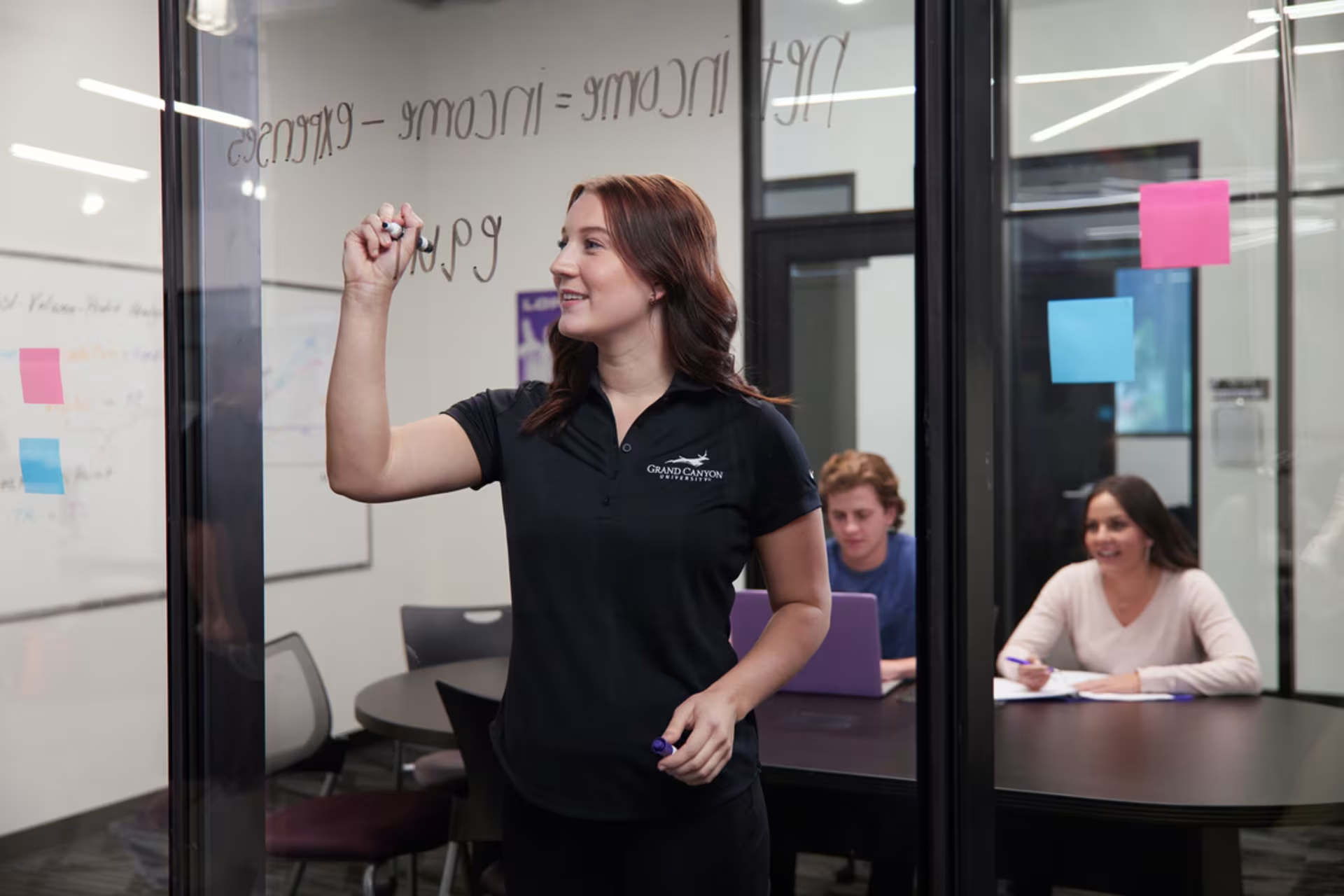
Bachelor’s in Accounting
Pursue Your Passion for Numbers With a Degree in Accounting
The Bachelor of Science in Accounting degree at GCU can lead graduates to pursue a wide range of roles in the business world. If your aim is to contribute to the success of organizations or work one-on-one with clients in need of financial services, consider earning your bachelor’s in accounting. This degree program provides students with a strong foundation in both theoretical accounting principles and practical applications.

Up to 90 credits, only 84 can be lower division
Credits: Fill out the Lopes Eval to find out what will transfer
Admission Requirements (Bachelor's)
- 16+ years old
- High School Graduate
- 3.0+ Unweighted GPA
OR 2.5+ Unweighted GPA and
- ACT: 19
- SAT: 1000*
Admission requirements may differ based on degree level, program and modality, or transfer status. Some programs of study may require a higher GPA and/or other qualifying criteria for admission. Please review full admission and program requirements in the University Policy Handbook.
*Math and reading only on a 1600 point scale (test date after 3/1/2016). SAT score of 1380 required for 2400 point scale (test date before 3/1/2016).
Strengthen Your Financial Knowledge With GCU’s BS in Accounting
While earning your accounting degree from the Colangelo College of Business, you can benefit from our focus on intrapreneurial and entrepreneurial principles that can support your career aspirations. Our courses emphasize the importance of servant leadership and professional ethics, encouraging you to work toward becoming a values-driven leader in your field.
At GCU, you can build a foundation for your future career. The preparation you receive as an accounting student qualifies you to sit for the Certified Management Accountant (CMA) exam as you are completing your program.
As an accounting student, you can complete your classes online, offering you the added flexibility to balance your education with other commitments. The BS in Accounting classes are taught by knowledgeable faculty and staff that help prepare students for a professional accounting career. Our online learning community has access to interactive features, including discussion boards, eBooks and helpful calendar reminders.
Students who prefer a traditional college experience can earn a bachelor’s degree in accounting on our campus. Enjoy in-person discussions with peers and instructors, and benefit from the wide range of campus resources available. GCU’s campus is an oasis in the desert, with plenty of recreational options, popular dining venues, clubs and events.
Study Core Topics in Accounting, Finance and Business Management
A Bachelor of Science in Accounting degree from GCU can prepare you to work in various roles related to accounting. Courses in accounting, finance and other related areas will teach you to apply theory to practical situations. You will take a deep dive into core accounting competencies while exploring other business-related topics for a well-rounded education in the field.
Throughout the program, you will examine topics such as:
Marketing
Economics
Financial, managerial and cost accounting
Ethical and legal issues in business
Organizational behavior and management
Business finance and statistics
Production and operations management
Strategic management

Prepare To Tackle Modern Business Challenges in These Five Domains
The Colangelo College of Business at GCU establishes five domains in which students are given opportunities to excel. The competencies within each domain are designed to ensure that graduates can interpret financial information and communicate their findings to a variety of stakeholders. Accounting students are also taught to be capable of making informed decisions and providing data-based financial insights. Government and industry regulations, and conscious, ethical financial decision-making are areas of focus for this degree program.
We pride ourselves on teaching graduates to meet competencies across these five domains:
Accounting
Business communication and critical thinking skills
Information literacy and data analysis
Business operations and environments
Legal, ethical and values-driven business
Use Your Bachelor’s in Accounting To Make an Impact in Business
Graduates of this accounting degree may go on to work in a number of different accounting and finance-related positions. Some roles you may consider include:
Accounting professionals may work across sectors, including at government agencies or at private businesses. Many accountants work for tax preparation, bookkeeping and payroll service companies, while others work in the insurance industry. There is also opportunity within this field for self-employment.(See disclaimer 1)
Estimated job growth for accountants and auditors from 2024 to 2034 is projected to reach 72,800
Earn Your Accounting Degree From an Accredited University
This BS in Accounting degree has received accreditation from the Accreditation Council for Business Schools and Programs (ACBSP). ACBSP confers programmatic accreditation after evaluating academic quality, research promotion, instructional quality and other factors. In addition, GCU has been institutionally accredited by the Higher Learning Commission since 1968. The Colangelo College of Business shares the university’s commitment to upholding the principles and standards established by our accrediting bodies.
Frequently Asked Questions
To learn more about earning your accounting degree, read through our frequently asked questions and start planning your accounting career.
Is an accounting degree a BA or BS?
Is the Bachelor of Science in Accounting worth it?
What can you do with an accounting degree?
Program Curriculum
General Education Requirements
Core Courses

Accountants help businesses make smart financial decisions. If you’re interested in supporting the success of organizations, consider earning a BS in Accounting.
1. U.S. Bureau of Labor Statistics. (2025, Aug. 28). Accountants and Auditors: Work Environment. Occupational Outlook Handbook. Retrieved October 2025.
2. COVID-19 has adversely affected the global economy and data from 2020 to 2023 may be atypical compared to prior years. Accordingly, data shown is effective August 2025, which can be found here: U.S. Bureau of Labor Statistics, Occupational Outlook Handbook, Accountants and Auditors, retrieved October 2025.
3. Best Accounting Degrees. (n.d.). What Is the Difference Between a B.S. and a B.A. in Accounting? Retrieved October 2025.
4. The earnings referenced were reported by the U.S. Bureau of Labor Statistics (BLS), Accountants and Auditors as of May 2024, retrieved October 2025. Due to COVID-19, data from 2020 to 2023 may be atypical compared to prior years. BLS calculates the median using salaries of workers nationwide with varying levels of education and experience. It does not reflect the earnings of GCU graduates as accountants and auditors, nor does it reflect the earnings of workers in one city or region of the country or a typical entry-level salary. Median income is the statistical midpoint for the range of salaries in a specific occupation. It is very unlikely that a median salary will reflect an entry-level salary. It represents what you would earn if you were paid more money than half the workers in an occupation, and less than half the workers in an occupation. It may give you a basis to estimate what you might earn at some point if you enter this career. Grand Canyon University can make no guarantees on individual graduates’ salaries. Your employability will be determined by numerous factors over which GCU has no control, such as the employer the graduate chooses to apply to, the graduate’s experience level, individual characteristics, skills, etc. against a pool of candidates.


